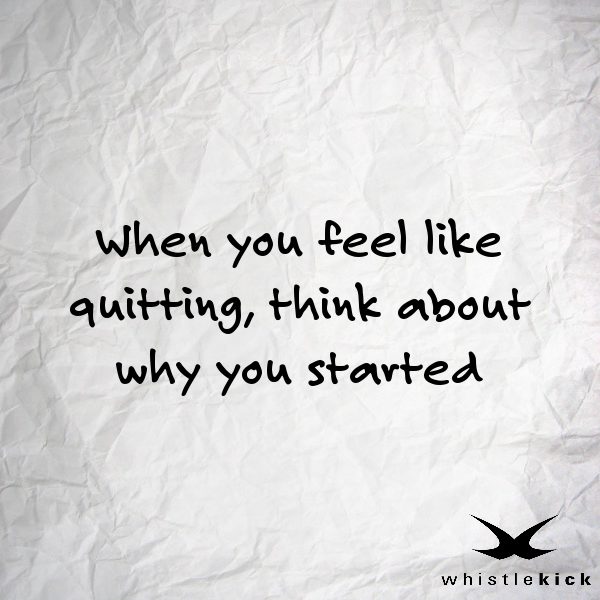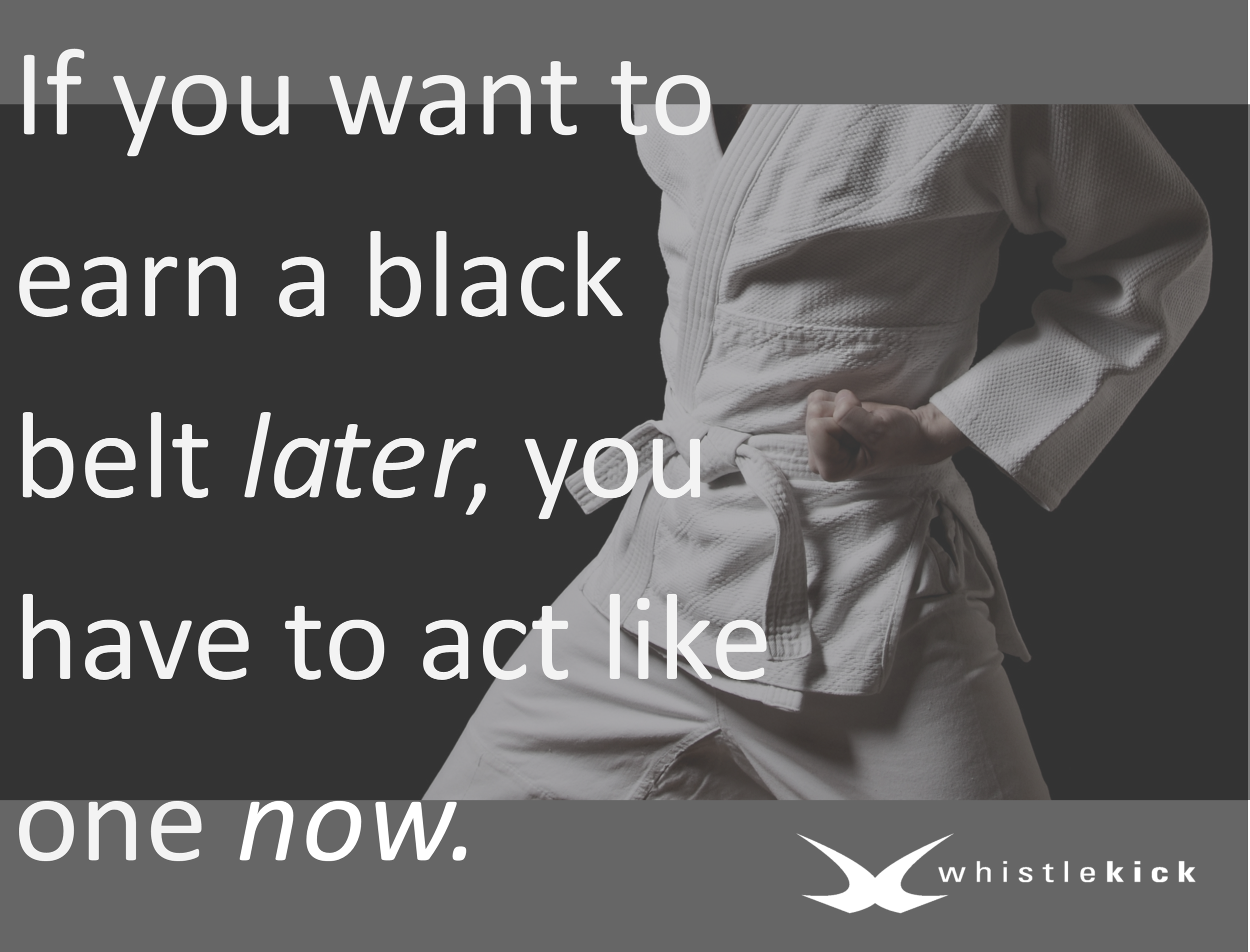Episode 65 - Finding Motivation for Your Martial Arts Training
Finding Motivation for Your Martial Arts Training - Episode 65
Today's episode comes out of discussions that have happened on this very show. We've had a number of guests admit openly that they've found themselves uninspired with their training at times, even bored. I've faced that myself, but I've always managed to move through it. I thought it time that we do an episode on this taboo subject and offer some suggestions on how you can beat the martial arts training blues. ~jeremy
Show Transcript
You can read the transcript below or download here.Jeremy Lesniak:Hey, there, everyone its episode 65 of whistlekick Martial Arts Radio, the only place to hear the best conversations about the martial arts, like today’s episode where we talk about feeling bored with your training.I'm the founder here at whistlekick, but I’m better known as your host, Jeremy Lesniak. whistlekick, in case you don’t know, makes the world's best sparring gear and some awesome apparel and accessories for you traditional martial artists. I'd like to welcome our new listeners and thank all of you returning fans.If you're not familiar with our products, you can learn more about them at whistlekick.com. All of our past podcast episodes, show notes and a lot more are at whistlekickmartialartsradio.com. Today’s episode also has a full transcript with lots of photos, videos and links on the website. If you’re listening from a computer, you might want to follow along with everything we’ve posted.And while you're over there, go ahead and sign up for our newsletter. We offer exclusive content to subscribers and it's the only place to find out about upcoming guests.Let’s dig into today’s subject. If you’ve been involved in the martial arts for any length of time, you’ve likely felt burnt out at some point. While we have had a few guests on the show who have claimed to excited to train, every time, every day, that’s not the norm. In fact, the inspiration from this episode came from conversations I had with guests right here on Martial Arts Radio. I’ve always viewed the subject, this whole “feeling uninspired “ or even “boredom,” as taboo. As a child I only had a few people in my world to discuss such a subject with, and they made me feel like there was something wrong with me. That I didn’t care about my training, or my instructors or the opportunity… whatever it was, it was my fault.I now know that it’s not my fault. It’s no one’s fault, it’s simply a situation that can and, for most of us, does happen. After all, the majority of people stop training at some point. How often do people stop doing something they absolutely love? Even if they can’t afford classes, they could do some training at home… you see what I mean? No, I’d argue that nearly every one of those people became bored, uninspired or otherwise lost the inspiration to train.And if it’s happening to most of the people that stop training, is there some magic difference between them and those of us that continue to train? I doubt it. In fact, I’d swear that there wasn’t. I think we all have different motivations for why we’re in the martial arts, and some of those motivations are going to be more tolerant of stress than others.But enough of beating the existence of the subject to death, let’s talk about how to handle it. I’d much rather offer you actionable ideas than simply commiserate with you over a problem we face together.The first thing you want to do is try and identify the source of your challenge. What has changed for you since you started martial arts, and give some time to think about why you started training in the first place. If you enjoyed the challenge initially, maybe you’re feeling like you’ve attained a certain level of proficiency, and that fire to improve is gone. If that’s the case, your solution is pretty easy – you need to learn more difficult things.While there are a lot of different problems and symptoms that we could stack up here – everything from feeling unchallenged to an intolerance of repetition to constant injury – I’d rather give you the solutions. These options are the best ways I know of how to combat the martial arts blues, and I’ve learned them over the years of my training.Yes, let me be really blunt here. I get bored with my training from time to time. After doing anything for a period of time, I get bored. I like variety, I crave it. But I’ve been doing martial arts longer than I’ve done anything else… why? Because I love it. And just because you don’t feel the urge to train, right now and in this moment, does not mean you don’t love the martial arts.Let me say it again. It’s okay. It doesn’t mean there’s anything wrong with you. There, feel better?Anyway, I promised you some possible solutions, so let’s do that now.
Train at a different time of day, or on a different day. If you’re lucky enough to belong to a school that offers classes at different times of day or the majority of the week, try changing up your schedule. You’re going to see different people than you normally see, the instructor may be different and, if nothing else, the energy of the class will be different. Different people create a different learning environment and that alone can be enough sometimes.
Take some time off. I went through a several year phase where I’d take the month of August off from my training. It’s hot, there’s a lot of great outside stuff to do and, more importantly, I found that by taking martial arts out of my life, it allowed me to miss it. I came back in September invigorated, anxious to get going again and tackle the things I was working on. Some people will say that it’s too easy to not come back if you step away. But, if that’s the case, maybe you shouldn’t be taking martial arts? At least not when and where you are?
Which is a great third option – look at taking classes at another school. Most of us are lucky enough to have multiple martial arts schools in our area. Whether you make a permanent switch, a temporary one, or just supplement your classes with additional classes at another school, it can really shake things up. Different instructors explain things in different ways, even within the same styles or the same school. If it feels appropriate, I’d recommend talking to your instructor about it beforehand.
Take some private lessons. Most people seem to respond well to challenges, and not everyone feels challenged by the general format of a martial arts class, especially as you progress in rank. Having a private lesson, even if it’s with the same instructor that runs the classes you attend, can be an exciting experience. To have some fine-tune your technique, or help you adapt something you’re working with to your own personal situation can give you context for your general martial arts training.
Competition can be a great option. A lot of us are goal oriented, and outside the preparation for a test, martial arts doesn’t give us a lot of firm goals. A competition or tournament is a great goal because it’s on an absolute day and it will generally involve people you don’t know. Choose a local competition and set a goal for attending, entering certain events, and maybe even aim for a certain result. I don’t think the result is necessary for everyone, but it might be for you. Whatever the case, tell your family and close friends about the goal – ask them to help hold you accountable. Your instructor may offer feedback to your training that’s appropriate for the competition.
You can set goals for other things, too. Maybe a particular technique or achieving another challenge, like breaking a certain number of boards with a technique. Again, the key is having an adequate level of difficulty and making it a priority. Telling people about your goal, writing it down and reading it out loud a few times a day… basically, anything you can do to help hold yourself accountable.
Take a seminar. I’ve been to quite a few different seminars with different martial artists. This can be a great option because it’s not as dramatic as changing schools, but still puts you around new people while you learn new things. Like I said earlier, that different dynamic brings different energy which can be incredible. I recently attended a seminar that made me re-think the way I hold my hands during sparring. It’s forced me to look at everything I do very differently, and I enjoy that.
Work out on your own. I know this sounds counter-intuitive. How can doing more of something, on your own time, make you enjoy it more? It’s about context. If you train on your own, you’ll naturally gravitate towards working on the things you enjoy most. You’ll get better at them and that’s going to make you feel good. Seeing improvement in something you enjoy is really motivating, not just for yourself but for the people around you.
Remember that martial arts isn’t just what goes on in training. You’re a martial artist, right? You’re not just a martial artist while you train, it’s a 24 hour a day, 7 day a week, 365 day a year status. So long as you consider yourself a martial artist, and you walk that path, you are. Training is only part of the path. Here on this show we talk about a lot of great books and movies that are entertaining but also educational. You can’t tell me that watching Bruce Lee or Jackie Chan isn’t inspiring. It sounds silly, I know, but some time when you’re alone, put on a martial arts movie and imagine yourself in the role of the hero. If you have the space, act out their fight sequences. It can bring life to what you’re doing, and it’s actually one of the ways I work with people on improving their martial arts forms. To associate martial arts with an entertainment medium you enjoy can be great.
Which brings me to #10 – work out to music. One of my current internal dilemmas is the place of music in martial arts training. On the one hand, it can be distracting, and pumping loud music through a traditional place of training seems blasphemous. On the other hand, training with music is motivating and exciting, and can really help spice things up. But if you’re training on your own, it doesn’t matter. You get to choose how you train, and I love training with music, especially when I’m working combinations.
I think we’ll leave it there. Ten is a great number, and maybe we’ll turn this into some list that will go viral and have martial artists all over the world feeling reinvigorated. Probably not, but it’s still a good number. Really, all of these ideas come back to the idea of topping off the tank, so to speak. Martial arts is a passionate activity – you’re giving so much of yourself over to it, and that only gets increasingly true with time and skill. When you give of yourself to something, you need to get back. Martial arts will always give you what you put in, but sometimes what you put in fades, or you have a harder time seeing what’s being returned. Whatever you do, it’s best to face any feelings of boredom or frustration quickly, because they only grow. I hope that, whatever you do, you don’t quit. I believe you’re better off as a martial artist and I believe the world is better because you are one.What did you think of today’s episode? Leave us a comment somewhere, either on the website or on social media. Do you have strategies that we didn’t talk about? Let us know about them so others can benefit. You can find the show notes, and a place for comments, at whistlekickmartialartsradio.com and as to social media, we're on Facebook, Twitter, Pinterest & Instagram - all with the username whistlekick.If you want to be a guest on the show or you know someone that has some good stories, please fill out the form on the website. And don't forget to subscribe to our newsletter so you can stay up on everything we do. You can learn more about our products at whistlekick.comSince you’ve already listened this far, I know you like the show…so please subscribe or download one of the apps so you never miss out in the future. We bring these shows to you twice a week, and while we’d love the support of your business, the main thing we ask for is a review. If you’re an iPhone user, please leave us a review in iTunes, and if you’re listening in some other way, please leave us a review or comment wherever feels appropriate. Thank you in advance.So, until next episode, Train hard, smile and have a great day.







